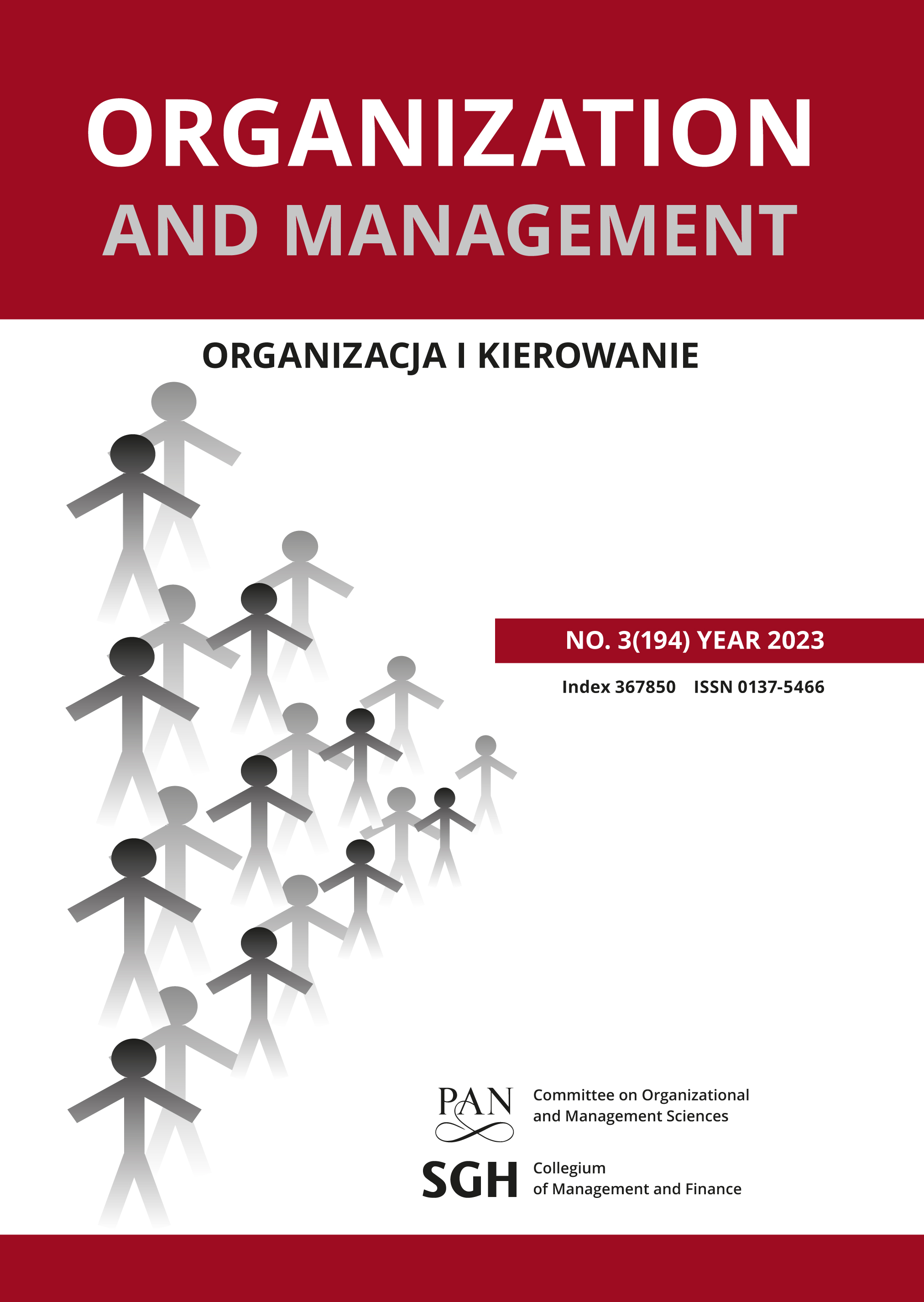GEN XERS IN UNCERTAIN TIME OF WORKING REMOTELY – AN EMPLOYEE’S PERSPECTIVE
Main Article Content
Abstrakt
The main goal of the paper is to explore the opinions of Generation X employees on remote work during the SARS-CoV-2 pandemic. A quantitative research method was used, specifically a diagnostic survey using the surveying technique and CAWI methods. The original questionnaire was based on two measurement scales: ordinal (Likert scale) and nominal (binary and categorical). The survey ended with a metric that enabled the collection of the socio-demographic characteristics of the studied population. Subsequently, a two-way data analysis method was applied as part of the adopted research methodology. Due to the nominal nature of the variables, frequency and percentage statistics were used in the statistical evaluation. For variables on the Likert scale, measures of descriptive statistics were used. Correctly completed questionnaires by 241 respondents were qualified for the final analysis. Research shows that the pandemic reality has created new challenges, forcing significant changes in personnel management practices. The obtained results made it possible to conclude that Gen X workers were highly involved in their workplace while working remotely. Unfortunately, they were also overworked and tired. Gen Xers strive to effectively perform their duties, regardless of whether they work at the company’s headquarters or at home. Due to the limitations of the research sample, it is essential to underline that generalizing the research results must be done with caution. Originality/value – Our paper contributes to the latest insight into remote work from the perspective of Gen Xers during the pandemic. The authors of this article recognize that it would be worthwhile to conduct the study over a longer period, which would allow for identifying the level of adaptation to remote work.
Article Details
Bibliografia
Adams S. J. [2000], Generation X: How understanding this population leads to better safety programs, Professional Safety 45: 26–29.
Becton J. B., Walker H. J., Jones‐Farmer, A. [2014], Generational differences in workplace behavior, Journal of Applied Social Psychology 44 (3): 175–189.
Benson J., Brown M. [2011], Generations at work: Are there differences and do they matter?, International Journal of Human Resource Management 22 (9): 1843–1865.
Cordeniz J. A. [2002], Recruitment, retention and management of generation X: A focus on nursing professionals, Journal of Healthcare Management 47 (4): 237–249.
Crampton S. M., Hodge J. W. [2011], Generation Y: Unchartered territory, Journal of Business and Economics Research 7:1–6.
Eurofound [2022], Recovery from COVID-19: The changing structure of employment in the EU, Publications Office of the European Union, Luxembourg.
Growth from knowledge [2020], W czasie pandemii najbardziej ucierpiała psychika polskich Milenialsów i Generacji X. Retrieved from https://www.gfk.com/pl/prasa/ trendkey-w-koronie (accessed: 30.01.2023).
Gursoy D., Maier T. A., Chi C. G. [2008], Generational differences: An examination of work values and generational gaps in the hospitality workforce, International Journal of Hospitality Management 27 (3): 448–458.
Hart K. A. [2006], Generations in the workplace: Finding common ground, Lab Management 38 (10): 26–27.
Ivasciuc I. S., Epuran G., Vuță D. R., Tescașiu, B. [2022], Telework implications on worklife balance, productivity, and health of different generations of Romanian employees, Sustainability 14 (23): 1–24.
Jeruszka U., Wolan-Nowakowska M. [2020], Zarządzanie różnorodnością w organizacji, Difin, Warsaw.
Jurkiewicz C. L. [2000], Generation X and the public employee, Public Personnel Management 29 (1): 55–74.
Kubiak E. [2014], Pokolenie X na rynku pracy, in: Rogozińska-Pawelczyk, A. (ed.), Pokolenia na rynku pracy, Wydawnictwo Uniwersytetu Łódzkiego, Łódź.
Kupperschmidt B. [1998], Understanding generation X employees, The Journal of Nursing Administration 28 (12): 36–43.
Lai S. L., Chang J., Hsu L. Y. [2012], Does effect of workload on quality of work life vary with generation?, Asia Pacific Management Review 17 (4): 437–451.
Lissitsa S., Kol O. [2016], Generation X vs. Generation Y – a decade of online shopping, Journal of Retailing and Consumer Services 31: 304–312.
Loomis J. E. [2000], Knowledge management and the X generation, Rough Notes 143 (12): 24–26.
Losyk B. [1997], Generation X: What they think and what they plan to do?, The Futurist 31 (2): 39–43.
Macalister K. [1994], The X generation, HR Magazine 29: 66–71.
Nieżurawska-Zając J. [2020], Motywowanie pracowników zróżnicowanych pokoleniowo, CeDeWu, Warsaw.
Smolbik-Jęczmień A. [2013], Rozwój kariery zawodowej przedstawicieli pokolenia X i Y w warunkach gospodarki opartej na wiedzy, Nierówności Społeczne a Wzrost Gospodarczy 4 (36): 228–238.
Smolbik-Jęczmień A. [2017], Kształtowanie własnej kariery zawodowej w kontekście wielopokoleniowości, Wydawnictwo Uniwersytetu Ekonomicznego we Wrocławiu, Wrocław.
Smolbik-Jęczmień A. [2019], Różnorodność pracowników w wymiarze wielopokoleniowości, in: Przytuła S. (ed.), Zarządzanie różnorodnością pracowników. Perspektywa globalnej mobilności i migracji, Wydawnictwo Naukowe PWN, Warsaw.
Smolbik-Jęczmień A., Żarczyńska-Dobiesz A. [2017], Zróżnicowane podejście do rozwoju zawodowego wśród przedstawicieli pokoleń koegzystujących na rynku pracy, Zarządzanie Zasobami Ludzkimi 1 (3-4): 169–184.
Taylor M. K. [2018], Xennials: A microgeneration in the workplace, Industrial and Commercial Training 50 (3): 136–147.
Twenge J. M. [2010], A review of the empirical evidence on generational differences in work attitudes. Journal of Business and Psychology 25 (2): 201–210.
Wiktorowicz J., Warwas I. [2016], Pokolenia na rynku pracy, in: Fonkowicz E. (ed.), Pokolenia – co się zmienia? Kompendium zarządzania multigeneracyjnego, Wolters Kluwer, Warsaw.
